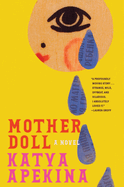
With her debut novel, The Deeper the Water the Uglier the Fish, Katya Apekina proved willing to stretch beyond readers' expectations. Mother Doll displays a similar defiance of norms as it deftly tangles with history and memory and generational trauma. Apekina's confidence is evident from the book's first line: "It was ironic that Zhenia and Ben would come home from spending time with people who had kids and be so giddy with relief and self-righteousness over their decision not to have any that it would make them want to fuck." More ironic is that this giddy act results in a pregnancy that threatens everything Zhenia thought she wanted.
Mother Doll turns away from that domestic crisis in chapter two, plunging readers into a shadowy afterlife world with this introduction: "We are an undifferentiated cloud. We are all dead and none of us have been able to move on. We talk at once. We are aggrieved. Our chatter is endless." This liminal space, reminiscent of that in George Saunders's Lincoln in the Bardo, is where the medium Paul encounters Irina, who explains, "I died at ninety-six on Long Island. But by then it wasn't me who died... I am the part of her that she never successfully buried." Irina is seeking a kind of absolution, which she hopes to accomplish by telling her great-granddaughter, Zhenia, her story, rooted in the atrocities of the Russian Revolution of 1917. Moving fluidly between Zhenia's present and Irina's past, Mother Doll is a startlingly sharp and affecting novel, exploring notions of motherhood, desire, and possession. --Sara Beth West, freelance reviewer and librarian

